When purchasing a business, buyers often prefer that the transaction be structured as an asset purchase rather than a stock purchase. In a stock purchase, the buyer purchases the target company as an entity, and therefore assumes the seller’s liabilities, since the company being acquired retains all of its liabilities as a matter of law. By restructuring the transaction as an asset purchase rather than a stock purchase, a buyer is provided with a much greater level of protection against liability for the target company’s obligations.
The law in most jurisdictions has traditionally held that when one company sells all of its assets to another, the buyer does not become liable for the debts and liabilities of the selling company. This is still true to a large extent, and we frequently recommend structuring a transaction as an asset purchase in order to protect the buyer from the liabilities of the business being acquired.
However, over the past several years, the theory of successor liability has evolved and expanded as a result of a series of clashes between the policy in favor of allowing a company to sell its assets in an unrestricted manner, balanced against other policies, such as providing a source of relief for injured parties or other claimants. As a result, in some cases, a purchaser of assets may be held liable for certain liabilities of the seller. Whether or not an entity buying the assets of another may be held liable for the liabilities of the seller is highly fact specific, and may depend upon the type of liability at issue, the jurisdiction in which the claim is made, and other factors which the courts may take into account in balancing these conflicting policies.
In this eight part series, we review exceptions to the general rule that a purchaser of the assets of a business is not responsible for liabilities incurred by the seller prior to the sale.
Part Two: De Facto Merger
Successor liability may exist in the event of a de facto merger. A de facto merger occurs where one corporation is absorbed by another, but without compliance with the statutory requirements for a merger. Typically these cases involve the transfer of stock in the buyer corporation to the seller’s shareholders after the buyer acquires the seller’s assets. If the shareholders of the selling corporation continue to have an ownership interest in the business it sold after closing, there is an increased possibility that the purchasing corporation may have successor liability under the de facto merger theory. If successor liability is a major concern in a transaction, the buyer should try to avoid structuring the transaction so that the owners of the selling company obtain an ownership interest in the purchasing company.
(Read Part 1: Express or Implied Assumption of Obligations…)
(Watch for Part 3: Mere Continuation of Predecessor…)
If you have questions about how to structure the purchase or sale of a business, please contact KDDK attorney Jeffrey K. Helfrich at jhelfrich@KDDK.com or (812) 423-3183, or contact any member of the KDDK Business Law Practice Team.
About the Author

Jeff Helfrich is a business attorney with more than 30 years’ experience whose practice includes mergers and acquisitions, real estate, commercial finance, business organizations, and healthcare law. Jeff represents businesses locally and nationwide in a variety of general business matters, including the formation of new businesses, the purchase and sale of businesses, the negotiation of business and real estate contracts, and resolving shareholder disputes. Jeff has also represented banks as well as commercial borrowers in the negotiation, preparation and review of loan documentation.




